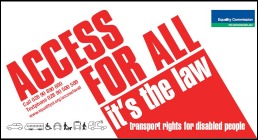
02/05/2014
A 31-year old Derry solicitor has, with the support of the Equality Commission, settled his disability discrimination case against a taxi-driver and a local taxi firm.
Gareth McCay, who is tetraplegic and a single leg amputee, asked for his £800 settlement to be paid to Spinal Research and accepted reimbursement of £185.
The incident that triggered the proceedings was at the end of a night out in November 2012 for Gareth and his brother, when they called a taxi. Gareth’s wheelchair is the lightest on the market, with detachable wheels and cushions and a folding back rest. It fits in the boot of most standard saloon cars, but if it does not fit the boot, it can fit into the front or back seat-well.
When the taxi arrived, the chair did not fit in the boot and Gareth alleges the driver refused to take it in the back seat, said that his insurance would not cover it and that he would have to get out of the car. By now a crowd of people had gathered round the taxi.
His brother re-assembled the wheelchair, but in his haste to get out of the car, Gareth caught his prosthetic limb on the door and it came loose. He managed to get back into the wheelchair and onlookers offered him their taxi.
Gareth says his calls to the taxi company were not returned, although the firm did subsequently respond to a letter and eventually agreed to settle the case in March 2014. Both the taxi company and the driver have expressed their regrets about the incident and the company affirmed its commitment to equality of opportunity in the delivery of its services. It will be liaising with the Equality Commission to ensure that it complies with equality legislation, including the Disability Discrimination Act 1995.
Gareth says: “My confidence took a serious knock that night and it was some time before I felt like going out socially again. I have not returned to the same bar. I felt that the driver did not handle the situation on the night properly, and the company then compounded that by not responding to my initial contacts. I am relieved the process is over, and I’m keen to use my experience to try and make sure that this doesn’t happen to anyone else in my situation.”
Anne McKernan, Director of Legal Services at the Equality Commission, said: “This case points up how important it is that taxi drivers do not immediately make negative assumptions about issues like the carriage of wheelchairs.
“Taxi drivers, and other service providers, should consider the particular requirements of the individual customer and make whatever reasonable adjustments are needed to provide them with a service.”
“In this case Mr. McCay was placed in a very distressing situation which proper consideration and a reasonable accommodation could have avoided. Under the settlement terms the firm concerned have agreed to meet with the Commission and we will be providing them with advice about such situations and the requirements of the law.”
“The Commission can advise any person who believes they may have been subjected to unlawful discrimination and also gives guidance and advice on the law to service providers.”
ENDS
Note to editors:
Taxi drivers have obligations under disability legislation not to discriminate against disabled people. They cannot refuse to provide a service or provide it to a lower standard or on worse terms than they would to any other member of the public. The law also requires that they make reasonable adjustments for disabled people using their service. For further information see the disability discrimination transport regulations